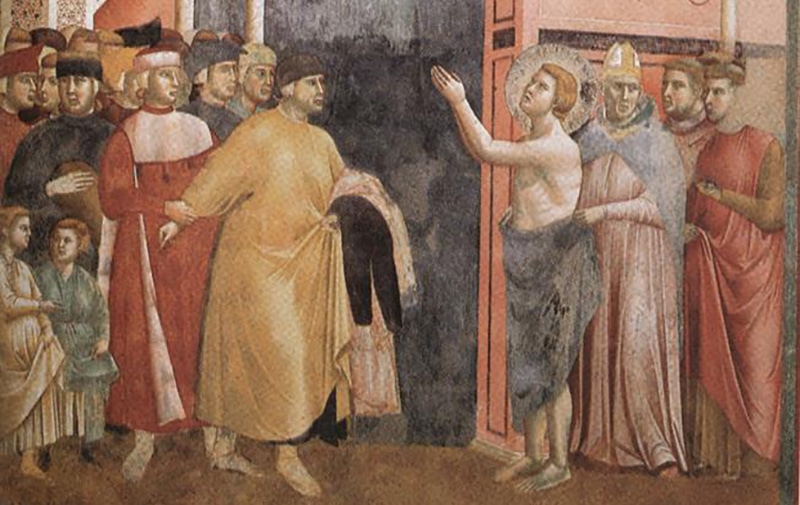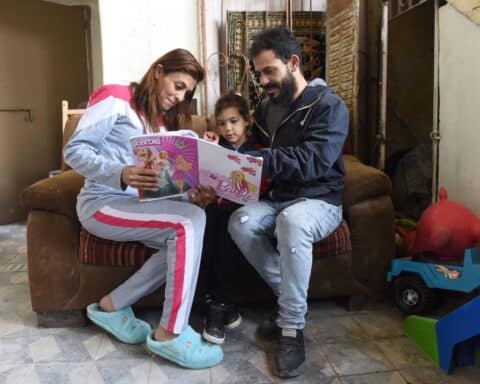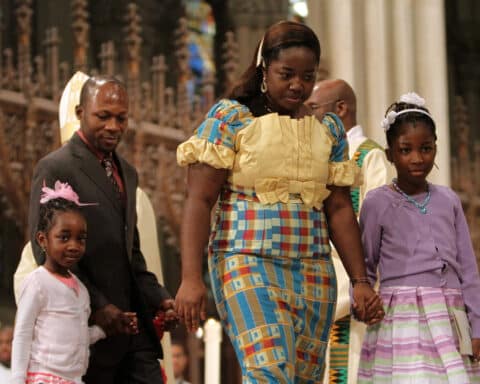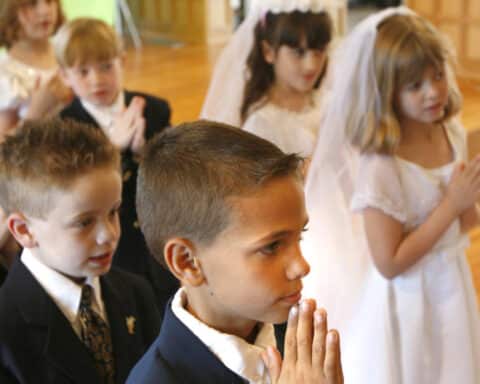It is customary to assume that children rebel against their parents. What is often discounted, though, is just how strong the influence of parents is. If children do rebel, it is rebellion against the standard the parents have established. Rebellion itself shows the outsized influence of parents.
It turns out, however, that the myth of rebellion is overblown. According to a representative study of the religious and spiritual lives of American teenagers, when asked what they would like to change about their family situations, the most common answer that teenagers gave was that “they wish they could be closer to their parents” (“Passing on the Faith,” Fordham University Press, $34.99). This finding pushes against the assumption that whatever parents profess and practice, their children will inevitably seek the opposite. It turns out that children are far from intrinsically set against their parents.
Rebellion of St. Francis
In those instances when rebellion becomes the defining, definitive response of a child to his or her parents, it is precisely the influence of the parent that the child is required to reckon with. Consider, for example, one of the most famous filial rebellions in the history of the Church: St. Francis of Assisi’s rebellion against his father, Pietro Di Bernadone.

Francis stripped himself of his clothing, divested himself of his inheritance and permanently separated himself from his father’s ways. Francis had to reckon with the customs of his world-wise and mercantile father; those are the customs that Francis ultimately rejected to pursue the truth and freedom he was beginning to discover in Christ. Perhaps Francis would have liked to have been closer to his father, but in the end, his father would not soften his ways, meaning that rejection was Francis’ only option if he was to follow Christ.
Francis lived in the 13th century, yet for those living in the 21st, it remains true that parents play the greatest role in the faith development of their children — for good or for ill: greater than friends, greater than youth groups, greater than media. As sociologist Christian Smith and researcher Justin Bartkus concluded in their study of American religious parenting: “Parents represent not simply an influence on the development of their children’s religious worldviews, but the arch-influence over it. … Parental influence is the condition of the possibility for other influences to take effect. What’s more, parental influence does not disappear as children mature.” What parents profess and practice marks their children for life.
Miniature culture
As a final takeaway from their interviews with 245 parents in 145 households, including 73 Catholic parents, Smith and Bartkus registered this resounding conviction:
“We believe that any parent who wishes to pass on their Catholic faith must understand their home as a miniature culture, a project which initiates children into certain core values, practices, and modes of experience, all of whose validity is constantly tested by what parents do and say in interpretive reinforcement of those convictions. … This idea of parenting as the building of a culture is often underappreciated; more prominent is the notion of parenting as a series of decisions regarding which experiences and investments will maximize children’s well-being. Yet, whether parents realize it or not, children are generally inclined to follow the grain of parents’ own attitudes and commitments, especially when it comes to religion. That is, in addition to providing for their wellbeing, parents inevitably teach their children how to live their lives.”
When parenting is treated as “a series of decisions” aimed at the vague horizon of “maximizing the children’s wellbeing,” it does not follow that the home ceases to be “a miniature culture” — rather, it means that the home is a culture of vagueness, one given to the sway of whatever happens to be the most powerful influence or apparent value by default. This means that the family home remains the most formative of all cultures for young people, whether or not the parents intend for it to be so.
What is valued and practiced in the home — what the space and pace of the home “says” — makes those raised in the home more likely to be formed in whatever mold is thereby given. At a minimum, a maturing young person has to reckon with that mold, whether for the sake of rejecting it or else for accepting it, and especially for critically and conscientiously accepting it. The family home is where a vision of the world is practiced and, therefore, it possesses the incomparable opportunity to become a formative culture.
On that level, too much attention is given to individual decisions that parents make and not enough is given to the customs parents keep. It is the customs that are the most formative and influential. These customs are typically chosen and nurtured long before children are introduced to them. For parents who wish to raise and form their children intentionally, especially when it comes to forming them in a life of faith, establishing intentional customs in and for the home is incomparably important.
The meaning and place of customs
By customs, we have in mind accepted and repeatable ways of behaving or doing something that is specific to the home — habits that both establish and express central values. There may certainly be a disconnect between what is stated as a value for a family and what the customs of a family actually communicate; when the disconnect exists, the more powerful formative influence is the custom rather than the stated value. When stated values and customs are in alignment, though, the power of the formative influence increases. Such alignment is typically the sign of an intentional culture, one where what is professed is practiced and what is practiced incarnates that which is professed.
For parents who desire to raise their children toward a true and meaningful life of faith, it is all the more important to develop, examine and commit to daily customs, weekly customs and annual customs that both represent and make present the reality of that life of faith.
It begins on the daily level since what is practiced daily establishes the most powerful and formative customs, if for no other reason than sheer frequency and repetition. If, for example, prayer is crucial to a true and meaningful life of faith (as it is), then the daily, familial habit of prayer inculcates that value. It is one thing to tell your children that praying is important, and yet another to pray together daily as a family custom … and yet another thing still to practice daily prayer as a parent so that your children see and know the truth of your words. Even a brief and unelaborate daily ritual of family prayer — likely but not necessarily evening prayer — is more powerful as a formative practice than infrequent solemn and profound prayer experiences (though both together are better still).
If comfort with silence and the development of the power of concentration are important for nurturing a life of faith (as they are), then how does the culture of the family home lead to growth in these ways? Are there customs on the daily or weekly level that provide space and time for silence and concentration, areas of the home crafted to foster such attentiveness, and periods of quiet focus that build up familiarity for all who live together in this place?
Habits of forgiveness and reconciliation
The same questions may be asked about the habit of forgiveness and reconciliation. If the willingness to seek and grant forgiveness is valued, how do the customs of the home foster that willingness through repeated practice, whether daily, weekly or even annually? Does a custom of the family regularly partaking in the Sacrament of Reconciliation make this value truly present (best of all, if this custom goes on the calendar so it is observed routinely rather than sporadically), and does a familiar even if difficult custom of talking through grievances build the kind of relationships in the home that we would hope to create outside the home? Many monastic communities keep to a weekly “airing of grievances” meeting where the monks confess how other monks with whom they live have grieved them; they then ask each other for forgiveness. That might be too intense as a regular practice in a family home, but the wisdom of the practice is nonetheless worth learning from.
Building a culture of a home is a long and intentional process, one that hopefully begins at the very beginning of family life (or even, ideally, before) and continues throughout with periods of examination, reassessment, and intentional choices. What matters in this regard is cultivating even a few, well-considered customs that become “natural” to their home and provide stability in the growing life of faith.
Sincerely,






